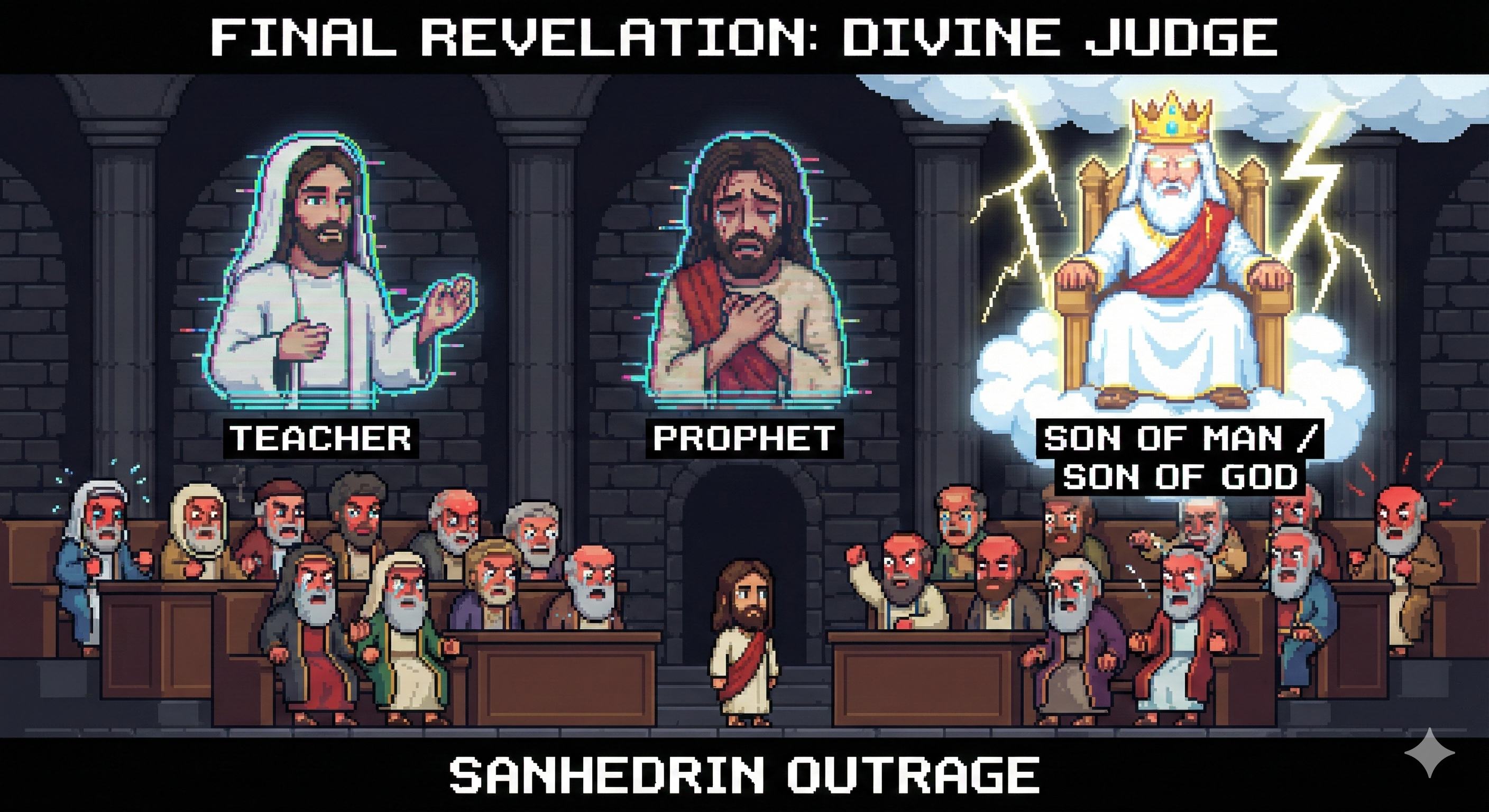Identity Declassification
System Analysis: From Cultural Hero to Divine Reality
OPERATIONAL OVERVIEW: Jesus's revelation was a progressive declassification. It began with the recognizable archetype of a "Cultural Hero" (Messiah/King), shifted to a transcendent "Sacrificial Agent," and culminated in a unique claim of "Divine Co-Regency" that forced a binary logical verdict.
// PHASE 01: THE CULTURAL HERO (Messiah)
"Hosanna to the Son of David! Blessed is he who comes in the name of the Lord!"
Matthew 21:9 (ESV)
ARCHETYPE ANALYSIS:
In this phase, Jesus allows Himself to be seen through the lens of the Warrior King. Like King Arthur or Bar Kokhba, the "Son of David" was expected to be a mortal liberator who would expel Rome and restore national glory. Jesus fulfills the prophecy (Zech 9:9) but stays within the understandable category of a "Great Human Leader."
// PHASE 02: THE TRANSCENDENT PIVOT
"From that time Jesus began to show his disciples that he must go to Jerusalem and suffer many things... and be killed, and on the third day be raised."
Matthew 16:21 (ESV)
MISSION REDEFINITION:
The revelation becomes subtle and transcendent. He introduces the Suffering Son of Man. This breaks the "Cultural Hero" mold. Heroes conquer; they do not intentionally die. The mission is revealed not as geopolitical liberation, but cosmic atonement.
// PHASE 03: THE SANHEDRIN (Divine Identity)
Jesus: "You have said so. But I tell you, from now on you will see the Son of Man seated at the right hand of Power and coming on the clouds of heaven."
Matthew 26:64 (ESV)
THEOLOGICAL FORENSICS:
Here, Jesus leaves behind all cultural archetypes. He claims to be the Son of Man (Humanity) and the Son of God (Divine Co-Regent, Ps 110:1, Dan 7:13). He asserts He is not merely a messenger, but the Divine Judge Himself.
// LOGIC GATE: THE SANHEDRIN VERDICT
PRAGMATIC EVIDENCE LOGIC:
Let us suspend faithful rhetoric and utilize pure evidence language. A man of notoriety claims to be the Son of God. The Sanhedrin is forced into a binary "IF-THEN" loop.
INPUT: Jesus claims "Right Hand of Power" (Divinity).
CONDITION A: IF the claim is FALSE...
-> THEN Jesus is a blasphemer.
-> THEN the death sentence is legally justified (Lev 24:16).
-> RESULT: They eliminated a heretic.
-> THEN Jesus is a blasphemer.
-> THEN the death sentence is legally justified (Lev 24:16).
-> RESULT: They eliminated a heretic.
CONDITION B: IF the claim is TRUE...
-> THEN Jesus is the I AM.
-> THEN the court has condemned the Author of Life.
-> RESULT: They have killed the Son of God.
-> THEN Jesus is the I AM.
-> THEN the court has condemned the Author of Life.
-> RESULT: They have killed the Son of God.
The High Priest tore his robes not because of a misunderstanding, but because he understood perfectly. The sentence of death was based on this point of reference alone.
// PHASE 04: PRAGMATIC CONFIRMATION (Resurrection)
EVIDENCE LOG:
The resurrection is the pragmatic answer to the Sanhedrin's logic loop. When Jesus walked again, He moved beyond "claiming" to "confirming." His physical presence was the data proof.
- The Physical Test: "See my hands and my feet, that it is I myself. Touch me, and see. For a spirit does not have flesh and bones as you see that I have." Luke 24:39 (ESV)
- The Skeptic's Test: "Put your finger here, and see my hands; and put out your hand, and place it in my side. Do not disbelieve, but believe." John 20:27 (ESV)
- The Biological Test: "Jesus said to them, 'Come and have breakfast.' ...Jesus came and took the bread and gave it to them, and so with the fish." John 21:12-13 (ESV)
FINAL SYSTEM STATUS:
A cultural hero dies and remains a legend. A blasphemer dies and remains a criminal. Only the Son of God dies and returns to eat breakfast with his friends. The Sadducees were incorrect.
